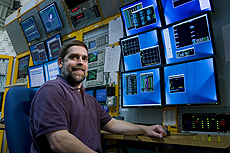Ron Moore, new chair of the Users' Executive Committee
 |
| Ron Moore, head of the Tevatron Department, in the control room. Moore was elected in September as new chair of the Users' Executive Committee. |
As head of the Tevatron Department, Ron Moore is part of an on-call group that accelerator operators can page at any hour, day or night, with problems.
As the newly elected chair of the Users' Executive Committee, Moore will be on call to represent more than 2,000 Fermilab users in an important but far less sleep-disrupting role.
The UEC's typical roles include organizing the Users' Meeting in June and serving as a liaison between users and Fermilab.
UEC committee members elected Moore as chair in early September. Moore decided he wanted to be a member of the committee last year at the suggestion of colleagues. Last year he served on the Users' Meeting Committee and chaired the Quality of Life subcommittee. He also participated in the UEC's annual trip to Washington with the SLAC and U.S. LHC Users Organization, leading to a greater interest in public outreach.
As part of that public outreach, Moore began blogging in June on Quantum Diaries, where he shares an inside look at the laboratory and writes about how scientists work, along with posts about what's going on outside the laboratory. He also provides daily updates on his Twitter and Facebook accounts, both of which have more than 300 followers.
During his one-year term as chair, Moore hopes Fermilab's users will actively participate in activities they arrange. Other priorities include making sure amenities users enjoy, such as Fermilab's pool and gym, remain open as much as possible.
Moore earned bachelor's degrees in physics and mathematics at Penn State University. As a Ph.D. student at the University of Michigan, Moore worked on the L3 experiment at CERN and joined the CDF experiment as a post-doc.
Moore joined Fermilab in 2001 in the Accelerator Division's Tevatron Department and is still a member of the CDF collaboration. He grew up in Greensburg, Pa., and lives in Batavia.
— Chris Knight
|